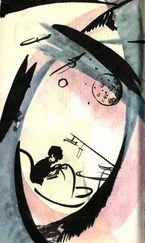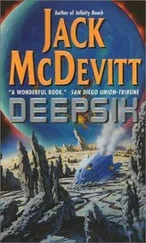Hutch watched it fade. Felt the first sensations of approaching transition.
“Stay with us, Hutch.”
INSIDE A SUPERLUMINAL, people usually take transition with little or no discomfort. Some get mildly ill, suffer disorientation, lose the contents of their stomachs. It’s why passengers are always cautioned to eat lightly, or skip the meal altogether, when a jump is imminent. Theory holds that the damping field, which protects against momentum effects, also helps limit the physical reaction. To Hutch’s knowledge, that was a notion that had never been tested, and consequently she had no idea what to expect riding the hull of the McCarver as it went sublight.
Had there been time, she’d have run her belt through the harness, in one sleeve and out the other, to make sure she didn’t fall off. But there hadn’t been time and now she was no longer sure where the belt was, or her harness, or her arm. Her mind retreated into a dark cave while everything around her swirled.
Somewhere she was holding onto something. And she should continue to do that. Hang on. Don’t let go.
Her gorge rose. Not good. There was no provision in the e-suit for emptying the contents of her stomach.
Once, at about the age of seven, she’d been playing with a swing that hung from a tree limb. In an experimental mood, she’d stood beside the swing and turned it round and round until the sustaining ropes were so twisted she couldn’t continue. Then she’d climbed into it and lifted her feet and it had begun to spin. It had continued spinning and suddenly the world was spinning and the sky was underfoot and she crashed into the ground.
It was like that now. The cave was turning, and she caught flashes of light but the images were all indistinct, faces, clouds, a stretch of metal hull, voices far off talking to her, or about her or maybe about the weather. Who knew?
Transition time is normally about six seconds. But vertigo went on and on until she became convinced that she and the belt had somehow slipped into one of the nether regions associated with TDI.
She threw up. Couldn’t help it. The warm wet sticky stuff went into her nose and back down her throat. She choked. Couldn’t breathe.
Darkness crowded the edges of consciousness.
There was a sudden blast of extreme cold. Suit was off. How the hell…?
It was her last thought as she slipped angrily into the night.
AS A RULE, Claymoor approved of heroic types. They made good copy, and they were generally self-effacing in interviews, unlike, say, politicians, who were always trying to take over the conversation. But there was a problem with heroes: They tended to get other, more reluctant, people involved in the heroics. Consequently, if a death-defying act was to be performed, it was always a good idea to arrive after it had been, successfully or not, completed.
He had tried to intervene when he saw what Hutchins was going to do, urging Brownstein to call off the jump. But he’d been too late, had hesitated too long. The ship might slip out of this ghostly place at any moment, and he was damned sure Henry Claymoor was going with it.
Given time, he’d have dragged the damned fool inside. But he’d had to settle for whispering good-bye and closing the hatch, grateful to be inside, thinking what a waste, somebody that attractive. He’d sat down on the bench, propping himself against a bulkhead, where he endured the brief giddiness that always assaulted him during jumps.
He’d learned they were easiest for him if he rode backward and closed his eyes. He’d done that. He knew when it was over, always knew because the vertigo went away as if someone had thrown a switch. And he was listening to Brownstein frantically calling Hutch’s name.
He reopened the hatch, and was delighted to see that she was still there. He had the imager ready and got pictures. But she’d apparently been knocked loose from her perch and was drifting away from the yacht. The running lights were trained on her. Her arms and legs were twitching, jerking, and he saw with horror precisely what had happened. She’d thrown up, clogged the narrow hard-shell air bubble that the e-suit provided over the face, and she was strangling on her own vomit.
Her struggles were growing more intense. She was already a long way from the ship. Maybe ten meters.
“Henry.” Brownstein’s voice. “Can you reach her?”
Claymoor paused in the hatch. Not really, he thought. Not me. She’s way the hell out there. Off the port beam, as they like to say in command circles.
“Henry?”
If Claymoor was devoted to anything, it was keeping risk to a minimum. Come out with a whole skin, that was his motto after a lifetime of working in, and beyond, the world’s trouble spots. But he’d produced when there had been nothing else for it. He’d been with the Peacemakers during the Guatemala rescue, he’d gone down once at sea in a flyer, and in his time he’d faced angry mobs and outraged heads of state.
And he’d hated every minute of it.
He gauged angle and trajectory, wondered what would happen if he missed, and jumped for her. But his adrenaline was running and he put too much effort into it. He was moving faster than he’d expected, and feared he would pass their intersection point before she arrived.
“Henry!” Brownstein’s startled voice. “Not like that. I wanted you to throw her a line.”
Lot of good that would do. The captain apparently hadn’t seen what Claymoor had.
Her struggles had begun to lessen. He was going to pass in front of her, but her belt was leading her, and he was able to grab it as he went past. It jerked her after him.
He congratulated himself, and caught a glimpse of the McCarver through his legs as they tumbled away. It was already beginning to look pretty far off.
He twisted her around to get at her right arm, found the red pad on the sleeve, and the emergency toggle inside her vest and shut off the field.
Flickinger fields are reflective. In the glow of the ship’s lights, Hutch had been surrounded by an aura. It blinked off, and the ejecta and a few frozen flakes of oxygen drifted away. He watched her spasm and cough. Next time, baby doll, don’t try to do everything yourself.
The vacuum helped. The air exploded out of her lungs, bringing the vomit with it. He released his vest, gave her face a quick wipe, and reactivated her suit. She coughed a few more times, but he was relieved to see that she was breathing again.
“What happened?” Brownstein broke in on him.
“She threw up,” he said.
“Okay. Hang on to her. I’ll send the shuttle over for you.”
Hutch struggled.
“Take it easy, Sweetcakes,” he said. “You’re all right.”
She tried to speak but couldn’t seem to get anything out. Claymoor smiled. She was not at all the take-charge little fireball who’d come aboard.
“Just relax,” he told her. “We’re still outside, but you’re okay.”
She looked at him and stiffened momentarily. Her eyes were bloodshot, and she was still gulping down a lot of air. She tried to rub her hands against her face but seemed surprised to find the shell. “E-suit,” she said.
“Yes.”
Her eyes drifted shut. “How’d we do?” she asked.
The question confused him until he realized it was meant for the captain.
“Don’t know yet. Can’t tell anything until we locate the chindi. We did run a bit longer in the sack than we should have.”
Hutchins nodded and she looked as if she were trying to digest what she’d just been told. Abruptly she turned her eyes on Claymoor. “Henry,” she said. “Thanks.”
“You’re welcome. I used to make my living rescuing beautiful women in distress.”
She made a gurgling sound that might have been an attempt to laugh. Or maybe she was still trying to clear her throat. He put a hand on her shoulder. “Yuri,” he said, “did we pick up the velocity we needed?”
Читать дальше








